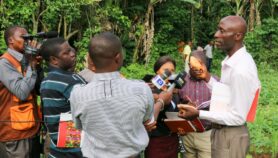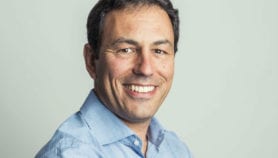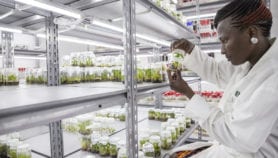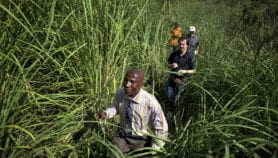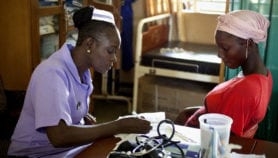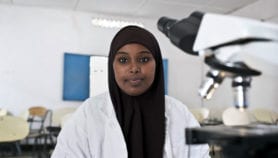Send to a friend
The details you provide on this page will not be used to send unsolicited email, and will not be sold to a 3rd party. See privacy policy.
[LONDON] Concrete action, as well as greater government and corporate accountability, must be chief outcomes of next year’s World Summit on Sustainable Development (WSSD). This was the message to emerge from a meeting in London on 13 November that drew together politicians, academics and non-governmental organisations (NGOs) from around the world.
But with less than a year to go until the summit, its agenda setters — to judge from presentations to the meeting — still lack a clear focus. And the general mood of the meeting included considerable scepticism of what the WSSD will actually be able to achieve.
The conference — entitled ‘Equity for a Small Planet’ and organised by the International Institute for Environment and Development to mark its 30th anniversary — offered an international platform to discuss the agenda of the WSSD, which will be held in Johannesburg next September.
The summit will bring together tens of thousands of participants, including heads of State and Government, representatives from NGOs, businesses and other major groups. It aims to continue the work started at the Rio Earth Summit 10 years previously, and in particular to improve people’s quality of life around the world while at the same time conserving natural resources, both in the context of an increasingly globalised economy.
Many of those attending the meeting expressed hopes that that Johannesburg would result in an unambiguous set of measurable actions. “Global agreements need to be more than earnest words,” said Canadian Environment Minister David Anderson.
His United Kingdom counterpart, Margaret Beckett, called for “practical outcomes” rather than “new conceptual agreements”, and drew a parallel with the way the recent Marrakech climate change meeting has given ‘legal teeth’ to the Kyoto Protocol, itself based on the framework agreement on climate change reached at the Rio meeting.
Many also stressed the need for corporate responsibility and pointed to the role that private finance could play in development. Simon Upton, for example, chair of the Round Table on Sustainable Development of the Organisation for Economic Cooperation and Development (OECD), called for reliable indicators of sustainable development in order to enhance accountability, rather than what he described as the “shrapnel of data and figures” that is currently available.
But fears were also voiced that, although the WSSD preparatory process is well underway, there is still a lack of clarity over the issues to be covered by the summit, with those involved scrambling to focus the agenda. “Johannesburg right now needs direction — to be frank it doesn’t have an agenda,” said Ashok Khosla, president of the Indian alternative technology NGO, Development Alternatives.
Over the course of the meeting, participants suggested a broad range of agenda items including sustainable livelihoods, climate change, biodiversity, gender equality, arms trafficking, population and food security. But speakers were hard-pressed to identify the single most important issue that they felt should be on the Johannesburg agenda, tending to fall back on the general term of ‘poverty eradication’.
There was a general agreement, however, that the WSSD must not centre on creating new objectives but should concentrate on implementing existing ones. Indeed some warned against tackling too many issues at the summit; “If we broaden the agenda too much we will end up with another fruitless North-South dialogue,” said Dan Nielsen, Danish Ambassador of Environment and Sustainable Development.
With the current lack of focus to the agenda, many were sceptical whether the WSSD will have far-reaching effects. Moss Mashishi, chief executive officer of the summit, noted a failure so far to integrate international systems for trade, finance and investment — such as the International Monetary Fund and World Trade Organisation — with sustainable development commitments. And Michael Odhiambo, executive director of the Resource Conflict Institute in Kenya, said that the reality in many parts of the world is that commitments made in international meetings have little effect on what happens at the local level.
Another major concern was how to involve all parts of society — including businesses, NGOs, local authorities, farmers’ associations, trade unions, women’s groups and youth groups — in preparations for the Johannesburg Summit.
“Johannesburg should be seen as a summit not just of governments, but of all stakeholders,” said Nitin Desai, Secretary General of the meeting. He added that stakeholders will be far more involved than they were in Rio, and that the first week of the summit will include special “partnership sessions”.
However, others were uncertain of how to engage a wide range of groups when sustainable development is largely seen as an environmental issue.
Despite talk of summit and promise ‘fatigue’, some were upbeat about what could be accomplished in Johannesburg. “We have an opportunity in the world summit that none of us should minimise” concluded Anderson.
But others were more cautious in their outlook. “Failure has become an acceptable outcome [of this type of conference] and we don’t want that to happen in Johannesburg,” said David Runnalls, president of the International Institute for Sustainable Development.
It is clear that the burden of Rio legacy will fall heavily on the shoulders on those involved during preparations for the WSSD. As Mashishi said, “Rio was the catalytic event that put environmental issues on the agenda”. Many left last week’s meeting uncertain whether Johannesburg will succeed in doing the same for development issues.
© SciDev.Net 2001



